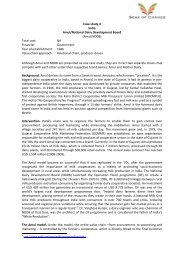Collection of Case Studies 2. - Seas of Change Initiative
Collection of Case Studies 2. - Seas of Change Initiative
Collection of Case Studies 2. - Seas of Change Initiative
You also want an ePaper? Increase the reach of your titles
YUMPU automatically turns print PDFs into web optimized ePapers that Google loves.
7. Agro-dealers in Zimbabwe: Scaling input provision as key forsuccessful small farmer engagementAuthor: Sithembile MaunzeOrganisation: SNV ZimbabweThis case is one <strong>of</strong> a series specifically prepared by SNV and local partners for the “<strong>Seas</strong> <strong>of</strong> <strong>Change</strong>” event,taking place in The Hague, 11-13 April 201<strong>2.</strong> The cases cover a range <strong>of</strong> commodities and approaches in valuechain development across Africa, Asia and Latin America. They usually include several <strong>of</strong> the following elements:strengthening <strong>of</strong> producer organisations, productivity improvement and value addition, business developmentservices, inclusive business ventures, contract farming, marketing arrangements and improved chain financing.The work has been done with local entrepreneurs, NGOs and government bodies. Among the internationalcollaborative partners are: IFAD, FAO, EU, USAID, DANIDA, Helvetas and IDB. The business partner involved in thecase is Rural Agro-dealers.Key featuresSNV coordinates The Rural Agro-dealers Restocking Programme (RARP) in Zimbabwe, a market-led approach torevitalizing agricultural production. The programme, now in its third phase, addresses systemic issues inagriculture with a focus on restocking <strong>of</strong> agro-dealers with agricultural inputs. In this way key needs and risks <strong>of</strong>small holder farmers are addressed, allowing them to obtain sustainable returns to their agricultural enterprises.To achieve this, SNV partnered with wholesalers, agro-dealers, and development agencies DANIDA, FAO, andHELP (Germany) as well as local capacity builders to improve the performance <strong>of</strong> dealers and others.RARP contributed significantly to farmer access to agricultural inputs. Through a relatively simple and smallinvestment (a total amount <strong>of</strong> US$112,000) in assurance <strong>of</strong> financial risks, in total 659 agro-dealers were linkedto wholesalers to receive agricultural inputs. Some 500 agro-dealers were also trained in retail businessmanagement. The agro-dealers distributed inputs worth over 9 million USD through voucher and cash sales. Anestimated 113,800 farmers accessed inputs in this way. In the third phase a further link is made to outputmarketing (i.e. agricultural produce) as well, assuring markets for farmers who saw increased productivity due tothe programme.1. Context and backgroundZimbabwe’s agro-inputs supply chains collapsed during a decade long economic recession that started in 2000.The worst affected group were smallholder farmers 10 in rural areas who did not have access to the right agroinputslocally at competitive prices and at the right time. Government and development agencies sought to solvethe problem. However, their agro-inputs programmes were mainly donations which lacked sustainability.In 2007, the FAO invited SNV to develop innovative ways <strong>of</strong> re-establishing rural input value chains. FAO preferredSNV because <strong>of</strong> its market-based approach. SNV’s initiative was to revive rural agro-input shops (commonlyknown as agro-dealers) for the delivery <strong>of</strong> affordable agro-inputs to rural farmers. The Rural Agro-dealerRestocking Project (RARP) was first implemented in 2009 as a pilot project designed to test the appropriateness<strong>of</strong> market-driven input distribution methods in an emerging economic environment. It was funded by Cordaid(insurance) and FAO (capacity building) and implemented by SNV Zimbabwe. It was hoped that the programmewould provide useful information for re-shaping rural inputs assistance for 2010/11.In the pilot project, rural agro-dealers played an important role in the chain by selling the inputs <strong>of</strong> their choice tosmallholder farmers and by buying their produce as agricultural commodity traders (output marketing). Theimportance <strong>of</strong> agro-dealers was recognised by other actors in the development community as well, and aidorganisations shifted to implement open voucher systems in order to provide farmer beneficiaries with the inputs<strong>of</strong> their choice. In the pilot, a total <strong>of</strong> 71 rural agro-dealer shops (selling seeds, fertilisers, chemicals, and farmingimplements) participated and 700 metric tonnes <strong>of</strong> seed and fertilisers respectively with a total value <strong>of</strong> overUS$545,000 were sold.10Smallholder farmers are living in rural areas, with landholding <strong>of</strong> between 0.5ha and 3ha on average and are mostly subsistenceoriented.32







